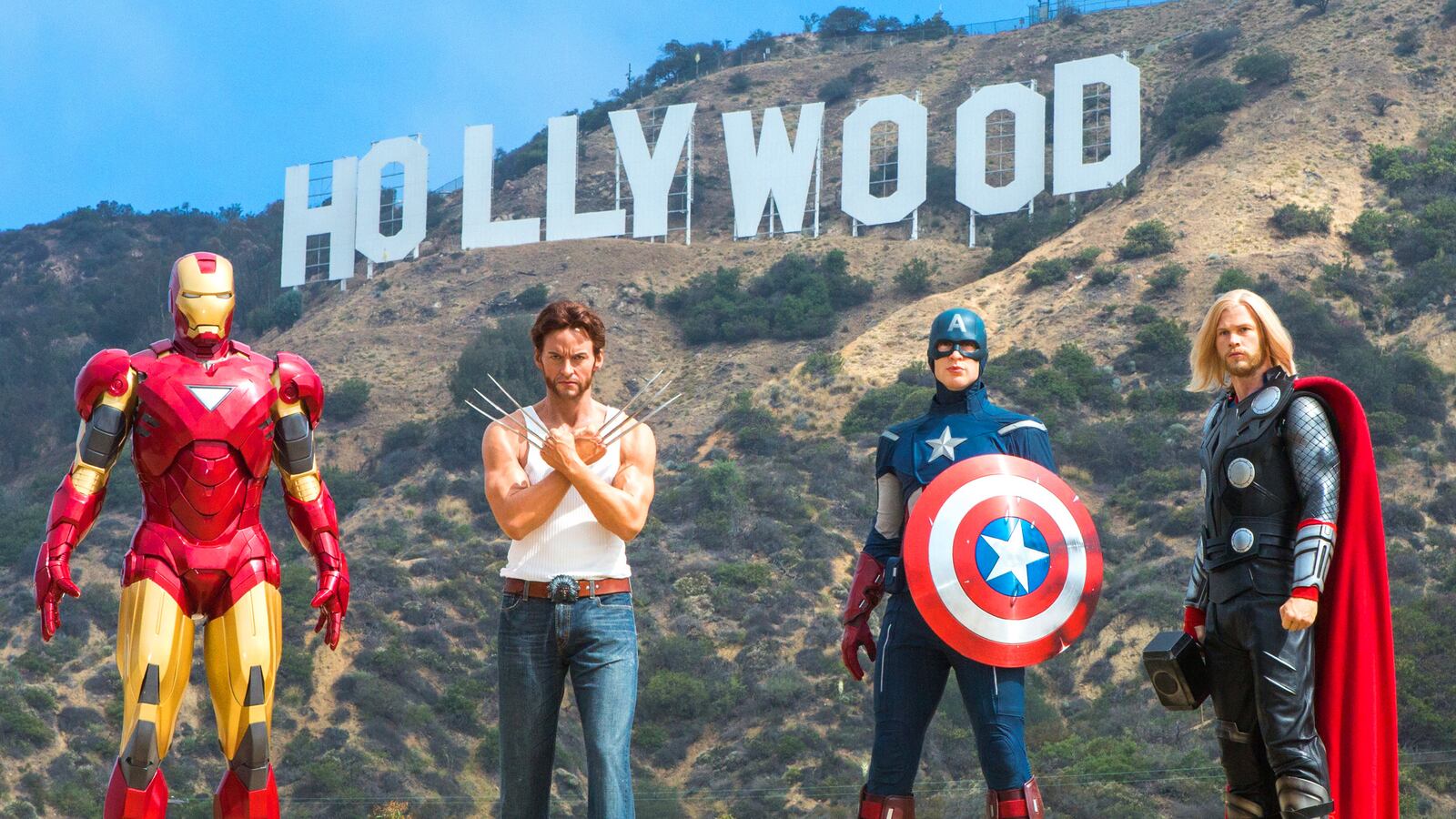In 1957, Life Magazine wrote about the collapse of the Hollywood Studio System:
With the assembly line broken down and the mass production methods of the past made obsolete, no other key to profits, or even to continued solvency, was left.
The proportion of Hollywood's revenue coming from overseas has been rising and rising in the last few years (because domestic revenues have been dropping) and stands now at an unparalleled 40 to 50% of the total worldwide film rentals Hollywood takes in.
50 years later, those same alarm bells ring every few months. However, like a test of an emergency broadcast system, if it had been an actual emergency, the message would be followed by a spate of subtitled superheroes and a gritty Pippi Longstocking reboot.
As of 2014, The Avengers, the highest grossing comic book adaptation to date (and the third highest grossing movie of all time), earned 59 percent of its total gross overseas. In 2013, the last year for which data is available, the average per film was 69 percent.
A 30-40 percent increase seems like a lot, but spread out over the 57 years since Life issued their dire proclamation that amounts to a change of about +0.6 percent per year. Following that same logic, it is therefore safe to assume foreign audiences will account for 100 percent of Hollywood’s box office revenue by the year 2060. That is approximately the same year the BBC predicted Moon mining could become commercially profitable. Since 1972, Life Magazine has folded three times
With more than twenty planned comic book movie adaptations on the horizon, it is tempting to see a cinematic “bubble” forming around comic book franchises. But predictions of the genre’s demise have been vastly overstated. Just last year, Cracked.com predicted the comic “bubble” popping and cited the upcoming Guardians of the Galaxy as proof of the impending collapse. Three quarters of a billion dollars later, the film was the highest grossing movie of the summer, beating its closest rival, the well established Transformers franchise (which was also predicted to flop).
It appears that, rather than having burst, the comic book “bubble” is just getting started. Marvel has announced 11 comic book movies over the next five years while rival DC Comics currently has an equal number of films planned through 2020.
The most profitable comic book movie in sheer budgetary terms was 2010’s The Dark Knight Rises. On a budget of $130 million, it earned over $1 billion at the box office. The Avengers, despite its overall gross, only earned back 690 percent of its total budget. Still an impressive showing, but only enough to place it third highest of the last decade’s comic book movies (behind 300 which earned back $456 million on a $65 million budget).
Of the ten lowest performing comic book movies of the last decade, seven have been produced in the last five years: Jonah Hex, Punisher: War Zone, Whiteout, Sin City: A Dame to Kill For, RIPD, Son of the Mask, and Scott Pilgrim. Meanwhile, five of the top ten best performing were made in that same time frame: Captain America: The Winter Soldier, Guardians of the Galaxy, Iron Man 3, The Avengers, and The Dark Knight Rises. On average, the 73 or so comic book adaptations made since 2004 have earned about 270 percent of their budgets back at the box office.
It is important to note that this is a return of box office receipts only, which Edward J. Epstein, in his book The Hollywood Economist, said constitute about a tenth of total revenue after factoring in DVD sales, licensing, and foreign distribution. Added to that, film is only a part of the total comic package, with both companies’ ongoing graphic novel publication and television series rounding out diverse media portfolios.
And diversity is playing an ever increasing role in maintaining profitability. Despite their persistent racist homophobia on the Internet, comic book uberfans comprise a small part of the total audience for such films with some estimates placing the total as low as 4 percent. A report from Facebook last year indicates that as much as 40 percent of comic fans are women.
While still a vocal minority, the slavish devotion to a majority white and male fan base in the world of comic book adaptations is giving way to what some are calling a “Diversity War” between the two major studios.
Although The Hollywood Reporter acknowledged six of the planned comic book movies still focus on a cisgender, heteronormative white male lead, part of the upcoming releases will feature a Wonder Woman movie as well as adaptations of Cyborg, Shazam, and Aquaman with actors of color playing those roles. In their announcement today, Marvel fired back with a planned Captain Marvel movie featuring Carol Danvers and a Black Panther film starring actor Chadwick Boseman in the respective titular roles.
The diversity of comic book films, while often considered a recent trend, is more of a return to form. Although Spider-Man is often cited as the first film in the comic book movie revival, it was Wesley Snipes as Blade and Michael Jai White/Keith David as Spawn that rescued the comic book movie from the Schumacherean depths to which it had descended in the late 1990s.
The fear now is that declining revenues will be blamed on the attempts to diversify the lily white world of comic book films instead of a public bored with the repetitive, formulaic superhero movies from an entrenched culture of masculine cis-heteronormativity.
It is also worth mentioning again that previous success is no indication of future performance. While many fondly remember Star Wars, Star Trek, and Jaws, the films that spawned Hollywood’s current Blockbuster Era, less well remembered are their equally expensive, underperforming knockoffs like The Adventure of Buckaroo Banzai Across the 8th Dimension, Solarbabies, and Orca (despite the former’s cult status, and the later’s Ennio Morricone soundtrack).
With any luck, the comic book “bubble” will never pop, but all golden ages must eventually come to an end. Let’s just hope it’s never replaced with the propagandistic war pictures and westerns that once dominated American movie screens.





